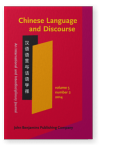A corpus-based study on Chinese sentiment parameters of Chinese sentiment discourse
Xiao-Ling Cui | Beijing University of Posts and Telecommunications, Beijing
Most previous work on sentiment identification and annotation has focused on the identification and annotation of attitudes and targets, while less work has been done on other sentiment parameters. In this paper, we aim to discover different lexical, syntactic and semantic features of Chinese sentiment parameters based on Appraisal Theory. The data are from an annotated corpus of Chinese commentaries, analyzed using both qualitative and quantitative methods. We find that sentence-level sentiment production is the collaborative work of the core sentiment parameter (attitude) with other peripheral sentiment parameters (topic, source, field, process and degree of attitude). The distribution of sentiment parameters is also restricted by word classes, syntactic and semantic features and functions. This work not only offers a new analytic framework for Chinese sentiment analysis, but will improve the precision of sentence-level machine extraction of sentiment expressions in Chinese, with implications for possible extension to other languages.
References
Bloom, Kenneth
2011 Sentiment Analysis Based on Appraisal Theory and Functional Local Grammars. Illinois Institute of Technology, Chicago dissertation.

Choi, Yejin, Claire Cardie, Ellen Riloff, and Siddharth Patwardhan
2005 “
Identifying Sources of Opinions with Conditional Random Fields and Extraction Patterns.” In
Proceedings of HLT/EMNLP
, 355–363.
Kennedy, Alistair, and Diana Inkpen
2006 “
Sentiment Classification of Movie Reviews Using Contextual Valence Shifters.”
Computational Intelligence 221: 110–125.


Kim, Soo-Min, and Eduard Hovy
2004 “
Determining the Sentiment of Opinions.” In
Proceeding of the International Conference on Computational Linguistics (COLING)
, 1367–1373.
Kim, Soo-Min, and Eduard Hovy
2005 “
Identifying Opinion Holders for Question Answering in Opinion Texts.” In
Proceedings of AAAI-05 Workshop on Question Answering in Restricted Domains
, 1367–1373.
Kim, Soo-Min, and Eduard Hovy
2006 “
Extracting Opinions, Opinion Holders, and Topics Expressed in Online News Media Text.” In
Proceedings of the Workshop on Sentiment and Subjectivity in Text
, 1–8.
Ku, Lun-Wei et al.
2008 “
Sentence-Level Opinion Analysis by CopeOpi in NTCIR-7.” In
Proceedings of NTCIR-7 Meeting
, 260–267.
Hu, Minqing, and Bing Liu
2004 “
Mining and Summarizing Customer Reviews.” In
Proceedings of the ACM SIGKDD International Conference on Knowledge Discovery & Data Mining
, 168–177.
Hunston, Susan, and Geoff Thompson
2000 “
Evaluation: An Introduction.” In
Evaluation in Text: Authorial Stance and the Construction of Discourse, ed. by
Hunston Susan, and
Geoff Thompson, 1–27. New York: Oxford University Press.

Hunston, Susan, and John Sinclair
2000 “
A Local Grammar of Evaluation.” In
Evaluation in Text: Authorial Stance and the Construction of Discourse, ed. by
Susan Hunston, and
Geoff Thompson, 74–101. New York: Oxford University Press.

Liu, Bing
2010 “
Sentiment Analysis and Subjectivity.” In
Handbook of Natural Language Processing, 2nd edn, ed. by
Nitin Indurkhya, and
Fred J. Damerau, 627–666. Boca Raton: Taylor and Francis Group.

Martin, J.R., and P.R.R. White
2005 The Language of Evaluation: Appraisal in English. London: Palgrave.


O’Connor, Brendan, Ramnath Balasubramanyan, Bryan R. Routledge, and Noah A. Smith
2010 “
From Tweets to Polls: Linking Text Sentiment to Public Opinion Time Series.” In
Proceedings of the Fourth International AAAI Conference on Weblogs and Social Media
, 122–129.
Pang, Bo, Lillian Lee, and Shivakumar Vaithyanathan
2002 “
Thumbs up? Sentiment Classification Using Machine Learning Techniques.” In
Proceedings of the Conference on Empirical Methods in Natural Language Processing (EMNLP)
, 79–86.
Pang, Bo, and Lillian Lee
2004 “
A Sentimental Education: Sentiment Analysis Using Subjectivity Summarization Based on Minimum Cuts.” In
Proceedings of the Association for Computational Linguistics (ACL)
, 271–278.
Riloff, Ellen, and Janyce Wiebe
2003 “
Learning Extraction Patterns for Subjective Expressions.” In
Proceedings of the 2003 Conference on Empirical Methods in Natural Language Processing (EMNLP)
, 105–112.
Ruppenhofer, Josef, Swapna Somasundaran, and Janyce Wiebe
2008 “
Finding the Sources and Targets of Subjective Expressions.” In
Proceedings of the Sixth International Language Resources and Evaluation
, 2781–2788.
Tumasjan, Andranik, Timm O. Sprenger, Philipp G. Sandner, and Isabell M. Welpe
2010 “
Predicting Elections with Twitter: What 140 Characters Reveal about Political Sentiment.” In
Proceedings of the Fourth International AAAI Conference on and Social Media. Association for the Advancement of Artificial Intelligence
, 178–185.
Turney, Peter D
2002 “
Thumbs up or Thumbs Down? Semantic Orientation Applied to Unsupervised Classification of Reviews”. In
Proceedings of the 40th Annual Meeting of the Association for Computational Linguistics (ACL)
, 417–424.
Whitelaw, Casey, Navendu Garg, and Shlomo Argamon
2005 “
Using Appraisal Groups for Sentiment Analysis.” In
Proceedings of the ACM SIGIR Conference on Information and Knowledge Management (CIKM)
, 625–631.
Wiebe, Janyce M., Rebecca F. Bruce, and Thomas P. O’Hara
1999 “
Development and Use of a Gold Standard Data Set for Subjectivity Classifications.” In
Proceedings of the 37th Annual Meeting of the Association for Computational Linguistics on Computational Linguistics (ACL-99)
, 246–253.
Wiebe, Janyce, and Ellen Riloff
2005 “
Creating Subjective and Objective Sentence Classifiers from Unannotated Texts.” In
Proceedings of the 6th International Conference on Computational Linguistics and Intelligent Text Processing
, 486–497.
Wiebe, Janyce, Theresa Wilson, and Claire Cardie
2005 “
Annotating Expressions of Opinions and Emotions in Language.”
Language Resources and Evaluation 39 (2-3): 165–210.


Wilson, Theresa, Janyce Wiebe, and Rebecca Hwa
2004 “
Just How Mad Are You? Finding Strong and Weak Opinion Clauses.” In
Proceedings of the 19th National Conference on Artificial Intelligence (AAAI-2004)
, 761–767.
Wilson, Theresa, Janyce Wiebe, and Paul Hoffmann
2005 “
Recognizing Contextual Polarity in Phrase-Level Sentiment Analysis.” In
Proceedings of the Human Language Technology Conference and the Conference on Empirical Methods in Natural Language Processing (HLT/EMNLP)
, 347–354.
Cited by
Cited by 1 other publications
Che, Siqi, Wenzhong Zhu & Xuepei Li
2020.
Anticipating Corporate Financial Performance from CEO Letters Utilizing Sentiment Analysis.
Mathematical Problems in Engineering 2020
► pp. 1 ff.

This list is based on CrossRef data as of 1 july 2024. Please note that it may not be complete. Sources presented here have been supplied by the respective publishers.
Any errors therein should be reported to them.
